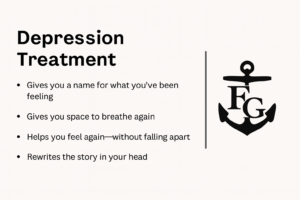There’s a fear you don’t say out loud—not to your therapist, not to your friends, maybe not even to yourself.
What if the darkness is the reason I’m able to create?
For deeply feeling, expressive, intuitive people, this fear cuts straight to the core. The grief, the rage, the melancholy—that’s where the work comes from, right? That’s the spark. You strip it away, and what’s left?
This is one of the biggest reasons artists avoid or delay depression treatment. Because what if feeling better takes away the depth? The edge? The thing that makes you you?
We get it. At Foundations Group Behavioral Health, we’ve worked with musicians, actors, designers, and quiet creatives alike—each one terrified that wellness would cost them their voice.
So instead of telling you “you’ll be fine,” we’re going to show you. These ten well-known artists and public figures didn’t lose their fire when they treated their depression. They found more clarity, more capacity, and more freedom to create on their own terms.
1. Lady Gaga: Boundaries Make the Performance Sustainable
Lady Gaga has spoken about living with PTSD, depression, and chronic pain—and how therapy, trauma-informed care, and even medication became part of her survival.
She didn’t lose her edge. She found her rhythm. Gaga still performs, still innovates, still connects. But she does it with a support system now.
“I take mental health very seriously, and I take medication every day for it.”
– Lady Gaga, ELLE Interview
She’s still the icon. She’s just not bleeding for the art anymore.
2. Dwayne “The Rock” Johnson: Pain Didn’t Define Him—He Chose the Narrative
You don’t become The Rock by being emotionally fragile. But behind the muscle and the movie roles is a man who’s been through serious depressive lows. He’s publicly talked about how therapy helped him understand his patterns and break cycles.
He didn’t stop being fierce. He just learned how to hold the weight without being crushed by it.
“You’ve got to talk about it, and you’re not alone.”
– Dwayne Johnson, Oprah’s SuperSoul Conversations
3. Ryan Reynolds: Anxiety, Humor, and Identity Can Coexist
Reynolds describes living with anxiety for most of his life. He’s built a career on comedic timing, improvisation, and sharp intellect—but still honors therapy as part of his long-term health.
He didn’t have to trade his humor to find calm. In fact, talking about it made him more human, more grounded—and more relatable than ever.
4. Chrissy Teigen: Messy Honesty and Medication Can Live Side-by-Side
Teigen’s brand has always been raw, vulnerable, funny. So when she talked openly about postpartum depression and the role treatment played in her healing, it hit home for thousands.
“You don’t have to pretend everything’s perfect.”
– Chrissy Teigen, Glamour
She’s proof that sharing the ugly parts doesn’t make you less creative. It makes you more real. And real connects.
5. Kendrick Lamar: Therapy in the Lyrics, Not Instead of Them
Kendrick’s 2022 album Mr. Morale & the Big Steppers explores therapy, trauma, Black identity, fatherhood, and emotional shutdown—all through one of the most layered and emotionally intelligent lenses in modern rap.
“I grieve different.”
– Kendrick Lamar
He didn’t lose his lyrical edge in therapy. He expanded it. If anything, his work got deeper.
6. Adele: Heartache Doesn’t Have to Hurt Forever
Adele’s voice is synonymous with emotional intensity. But even she has acknowledged that therapy helped her not just survive her divorce, but reconnect with herself.
She returned to therapy during the Las Vegas residency—not because she was falling apart, but because she wanted to stay anchored while creating something massive.
You don’t stop feeling big feelings when you get help. You just learn to carry them in a way that doesn’t crush you.
7. Kristen Bell: Medication Doesn’t Erase You—It Supports You
Kristen Bell has long been an advocate for transparent conversations about mental health, including her use of antidepressants.
“You would never deny a diabetic their insulin. Why should we deny our brains the support they need?”
– Kristen Bell, Women’s Health
She didn’t lose her sparkle. She just stopped pretending she didn’t need help. And she’s still doing voice work, producing, acting, and showing up with full-hearted depth.
8. Demi Lovato: Healing Isn’t the End of Creativity—It’s the Rebirth
Demi’s story is layered—with addiction, trauma, recovery, depression, identity, and the public eye all colliding. But throughout it all, their music hasn’t lost power. It’s gained precision.
They’re not writing from crisis anymore. They’re writing from clarity.
Depression treatment didn’t flatten their voice. It made it sharper.
9. Jim Carrey: From Depression to Presence
Carrey’s early comedic work was wildly performative—chaotic, even. But in recent years, he’s shared his experience with depression, and how therapy and a new relationship to self transformed his worldview.
“I used to be a guy who was experiencing the world. Now I feel like the world is experiencing me.”
– Jim Carrey, The Talks
He didn’t stop creating. He just started creating with intention.
10. Selena Gomez: Owning the Narrative
Selena’s mental health journey includes depression, anxiety, and a diagnosis of bipolar disorder. She’s shared openly about medication, hospitalization, and healing—and even co-founded a mental health company to help others.
“I was scared, but once I understood, it didn’t scare me anymore.”
– Selena Gomez, Wondermind
She’s still an artist. Still an actress. Still deeply emotional. And she’s clearer than ever.
But What If I’m Not Them?
Of course. You’re not them. You’re not famous. You’re not buffered by PR reps or multi-million-dollar contracts. So it makes sense if you’re thinking:
“That’s nice for them. But what if I lose the only thing that makes me feel alive?”
Here’s the truth we see every day at Foundations Group Behavioral Health:
- You don’t lose your creativity in treatment.
You gain consistency. Energy. Access to emotions without getting hijacked by them. - You don’t get erased.
You get more choice in how and when you access your depth. - You don’t get turned into someone else.
You become a version of you who can breathe.
Looking for Depression Treatment in Cape Cod?
Whether you live in Falmouth or nearby Barnstable County, you can get care that doesn’t threaten your creativity.
At Foundations, we work with creatives, feelers, deep thinkers—and we know how to talk about depression without flattening the human behind it.
Our depression treatment program includes:
- Individual therapy (CBT, ACT, trauma-informed)
- Psychiatric support (when and if you’re ready)
- Holistic approaches (mindfulness, movement, expressive work)
- Identity-affirming care
You don’t need to be “ready.” You just need to be curious about what else is possible.
FAQs: Creative Identity and Depression Treatment
Will medication make me numb?
Not if it’s the right fit. Many clients report more clarity and energy once stabilized—not less feeling.
Can I still feel emotionally intense on meds?
Yes. You may actually feel emotions more accurately—without spiraling.
What if I’ve only ever created when I’m in pain?
That’s a common pattern. Treatment helps you access your depth without needing crisis to get there.
Can I start therapy without committing to meds?
Absolutely. Many clients begin with therapy alone. You can go step by step.
Will people still relate to my work if I’m not suffering?
Yes. Audiences connect to truth, not torment. And you still have access to that truth.
Let Yourself Be Creative and Cared For
You’ve carried your feelings like firewood—fuel for the page, the stage, the canvas. But you don’t have to burn to light the way for others.
You deserve to feel better. And your art deserves to come from a place that doesn’t cost you everything.
Call 888-685-9730 or visit our Depression treatment program in Cape Cod, MA to learn more.









